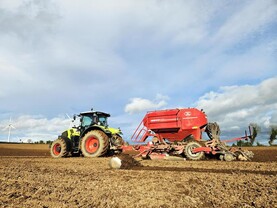Price increases on fertiliser are imminent, and could in some instances take affect from the start of next week, a number of merchants have confirmed.
Fertiliser prices normally ease during August, but this trend is not happening this year.
Price listings for August indicate CAN will increase by £10 to £20/t, with compound products going up by as much as £30/t.
It means CAN is likely to cost farmers between £270 and £275/t, which would be £90 to £100/t above its value during August of last year.
Compounds
Grassland compounds such as 25-5-5 are set to rise to approximately £340/t, with 27-4-4 plus sulphur settling at a similar level.
Twelve months ago, the same products were priced between £240/t and £260/t.
Early indications on August price listings put 20-10-10 in the region of £360 to £365/t.
Higher P and K
However, compounds commonly used during the planting of winter cereals face the most severe price hikes, as manufacturers react to a shortage in phosphorous and potash availability.
Indications are that products such as 16-15-15 will cost farmers in the region of £420/t, with some predictions this could rise to £440/t depending on availability, an increase of £110 to £120/t year on year.
South of the Irish border, compounds such as 18-6-12 and 10-10-20 are moving at €470 (£390) and €500/t (£425) mid-week, although some reports put 10-10-20 as high as €530 (£450/t).
Grain price
Global grain markets are extremely buoyant and as the arable sector accounts for 70% of global fertiliser use, high grain prices tend to fuel demand for fertiliser.
Wheat prices strengthened again this week, as markets reacted to further concerns around yield in both the Russian and US harvests. US maize forecasts also continue to shrink.
Inputs
Other crucial factors impacting fertiliser prices are the cost of energy and raw materials. Natural gas, which is integral to fertiliser manufacture, is seeing a global shortage, and prices have been rising steadily since April.
There has also been significant disruption to supplies of phosphorous and potash in recent weeks.
EU sanctions on potash originating from Belarus has had a knock on effect on global fertiliser production, as 20% of global potash is sourced from the country.
Canada is another key supplier of potash. Production there has been temporarily slowed due to the recent heatwave.
Read more
Fertiliser price surge continues as CAN up over 70%
Price increases on fertiliser are imminent, and could in some instances take affect from the start of next week, a number of merchants have confirmed.
Fertiliser prices normally ease during August, but this trend is not happening this year.
Price listings for August indicate CAN will increase by £10 to £20/t, with compound products going up by as much as £30/t.
It means CAN is likely to cost farmers between £270 and £275/t, which would be £90 to £100/t above its value during August of last year.
Compounds
Grassland compounds such as 25-5-5 are set to rise to approximately £340/t, with 27-4-4 plus sulphur settling at a similar level.
Twelve months ago, the same products were priced between £240/t and £260/t.
Early indications on August price listings put 20-10-10 in the region of £360 to £365/t.
Higher P and K
However, compounds commonly used during the planting of winter cereals face the most severe price hikes, as manufacturers react to a shortage in phosphorous and potash availability.
Indications are that products such as 16-15-15 will cost farmers in the region of £420/t, with some predictions this could rise to £440/t depending on availability, an increase of £110 to £120/t year on year.
South of the Irish border, compounds such as 18-6-12 and 10-10-20 are moving at €470 (£390) and €500/t (£425) mid-week, although some reports put 10-10-20 as high as €530 (£450/t).
Grain price
Global grain markets are extremely buoyant and as the arable sector accounts for 70% of global fertiliser use, high grain prices tend to fuel demand for fertiliser.
Wheat prices strengthened again this week, as markets reacted to further concerns around yield in both the Russian and US harvests. US maize forecasts also continue to shrink.
Inputs
Other crucial factors impacting fertiliser prices are the cost of energy and raw materials. Natural gas, which is integral to fertiliser manufacture, is seeing a global shortage, and prices have been rising steadily since April.
There has also been significant disruption to supplies of phosphorous and potash in recent weeks.
EU sanctions on potash originating from Belarus has had a knock on effect on global fertiliser production, as 20% of global potash is sourced from the country.
Canada is another key supplier of potash. Production there has been temporarily slowed due to the recent heatwave.
Read more
Fertiliser price surge continues as CAN up over 70%






 This is a subscriber-only article
This is a subscriber-only article











SHARING OPTIONS: